-
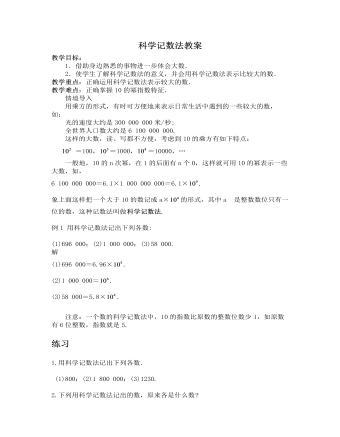
北师大初中七年级数学上册科学记数法教案2
光年是表示较大距离的一个单位, 而纳米(nanometer)则是表示微小距离的单位。1纳米= 米,即1米= 纳米。我们通常使用的尺上的一小格是一毫米(mm),1毫米= 米。可见,1毫米= 纳米,容易算出,1纳米相当于1毫米的一百万分之一。可想而知,1纳米是多么的小。超微粒子的大小一般在1~100 纳米范围内,故又称纳米粒子。纳米粒子的尺寸小,表面积大,具有高度的活性。因此,利用纳米粒子可制备活性极高的催化剂,在火箭固体燃料中掺入铝的纳米微粒,可提高燃烧效率若干倍。利用铁磁纳米材料具有很高矫顽力的特点,可制成磁性信用卡、磁性钥匙,以及高性能录像带等 。利用纳米材料等离子共振频率的可调性可制成隐形飞机的涂料。纳米材料的表面积大,对外界环境(物理的和化学的)十分敏感,在制造传感器方面是有前途的材料,目前已开发出测量温度、热辐射和检测各种特定气体的传感器。在生物和医学中也有重要应用。纳米材料科学是20世纪80年代末诞生并正在崛起的科技新领域,它将成为跨世纪的科技热点之一。
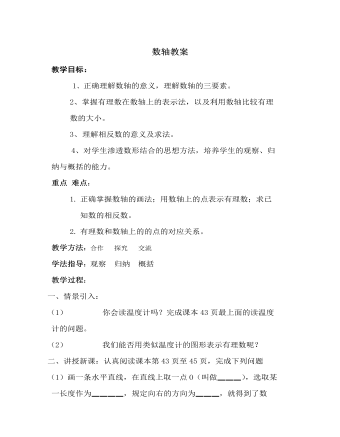
北师大初中七年级数学上册数轴教案2
议一议数轴上的两个点,右边点表示的数与左边点表示的数有怎样的大小关系?数轴上表示的数,▁▁▁边的总比▁▁▁边的大;正数▁▁▁0,负数▁▁▁0,正数▁▁▁负数。练习:比较大小:-3▁5; 0 ▁-4 ;-3 ▁-2.5。3、合作交流(1) 什么是数轴?怎样画数轴。(2) 有理数与数轴上的点之间存在怎样的关系?(3) 什么是相反数?怎样求一个数的相反数?(4) 如何利用数轴比较有理数的大小?5、随堂练习:(1)下列说法正确的是( ) A、 数轴上的点只能表示有理数B、 一个数只能用数轴上的一个点表示C、 在1和3之间只有2D、 在数轴上离原点2个单位长度的点表示的数是2 (2)语句:①-5是相反数?②-5与+3互为相反数③-5是5的相反数④-5和5互为相反数⑤0的相反数是0⑥-0=0。上述说法中正确的是( )

北师大初中数学八年级上册代入法2教案
第五环节:课堂小结内容:师生相互交流总结解二元一次方程组的基本思路是“消元”,即把“二元”变为“一元”; 解二元一次方程组的第一种解法——代入消元法,其主要步骤是:将其中的一个方程中的某个未知数用含有另一个未知数的代数式表示出来,并代入另一个方程中,从而消去一个未知数,化二元一次方程组为一元一次方程.解这个一元一次方程,便可得到一个未知数的值,再将所求未知数的值代入变形后的方程,便求出了一对未知数的值.即求得了方程组的解.目的:鼓励学生通过本节课的学习,谈谈自己的收获与感受,加深对 “温故而知新” 的体会,知道“学而时习之”.设计效果:学生能够在课堂上畅所欲言,并通过自己的归纳总结,进一步巩固了所学知识.第六环节:布置作业课本习题5.2教学设计反思1.引入自然.二元一次方程组的解法是学习二元一次方程组的重要内容.教材通过上一小节的实际问题,比较一元一次方程的列法和解法,从而自然引入二元一次方程组的代入消元解法.
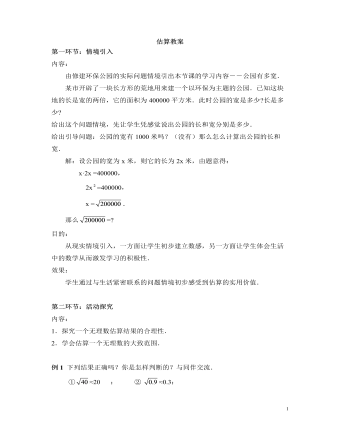
北师大初中数学八年级上册估算2教案
在探究估算方法的时候,教师要注重适时的引导,以免让学生无从下手.在教学过程中一定要让学生体会估算的实用价值,了解到“数学既来源与生活,又回归到生活为生活服务”.(二)课堂评价的一些思考在教学中要多鼓励学生用自己的语言表达他们的想法,在估算的过程中多给予适当的引导和评价,让学生逐步把握估算的方法,找到解决问题的信心.比如对“画能挂上去吗”这个问题情境,学生可能提出不同的看法,有些学生可能认为可以挂上去,因为人还有身高,完全可以弥补梯子稳定摆放的高度和挂画位置的高度之间的差距,有些学生可能认为,人不可能爬到梯子的顶部,加上人如果本来比较矮,画就不能挂上去等等想法,教师都应该给予肯定,这样才能激发学生思考问题的热情,调动学生探究问题的积极性.作为教师,一定要尊重学生的个体差异,满足多样化的学习需要,鼓励探究方式、表达方式和解题方法的多样化.
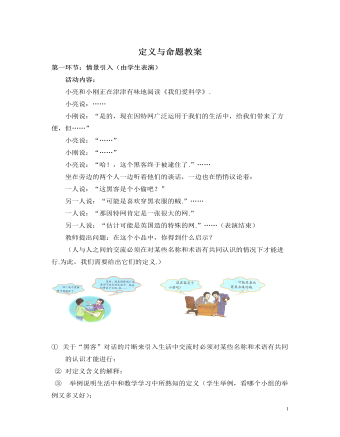
北师大初中数学八年级上册定义与命题2教案
② 命题的含义:判断一件事情的句子,叫做命题,如果一个句子没有对某一件事情作出任何判断,那么它就不是命题.活动目的:通过课后的总结,使学生对定义、命题等概念有更清楚的认识,让学生在头脑中对本节课进行系统的归纳与整理.教学效果:学生在有了前面对定义、特别是命题概念的学习后,能了解命题的结构,以及哪些是命题,使学生对命题的学习有了清楚的认识。第五环节 课后练习学习小组搜集八年级数学课本中的新学的部分定义、命题,看谁找得多.四、教学反思本节课的设计具有如下特点:(1)采用了“小品表演”的形式引入新课,意在激起学生对数学的兴趣,让学生知道,数学不是枯燥无味的。并能从表演中不同的人对“黑客”这个名词的不同理解更好地悟出“定义”的含义。
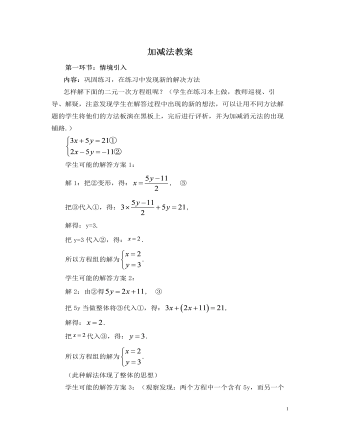
北师大初中数学八年级上册加减法2教案
2.法解二元一次方程组,是提升学生求解二元一次方程的基本技能课,在例题的设置上充分体现化归思想.2.在学习二元一次方程组的解法中,关键是领会其本质思想——消元,体会“化未知为已知”的化归思想.因而在教学过程中教师通过对问题的创设,鼓励学生去观察方程的特点,在过手训练中提高学生的解答正确率和表达规范性,提升学生学会数学的信心,激发学习数学的兴趣.3.通过精心设计的问题,引导学生在已有知识的基础上,自己比较、分析得出二元一次方程组的解法,在巩固训练活动中,加深学生对“化未知为已知”的化归思想的理解.特别是如何由代入消元法到加减消元法,过渡自然。让学生深刻的体会到二元一次方程是一元一次方程的拓展,二元一次方程组又要通过“消元”,转化为一元一次方程求解,这样的转化,不仅有助于学生掌握知识、技能和方法,提高学习效率,而且还加深了对数学中通性和通法的认识,体会学习数学和研究数学的规律,提升数学思维能力.
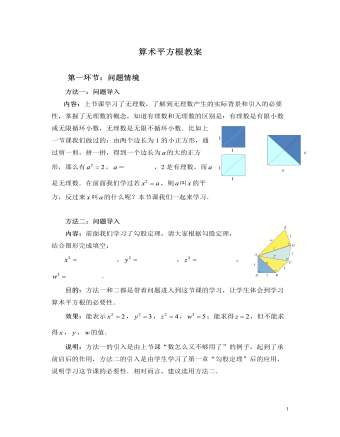
北师大初中数学八年级上册算术平方根2教案
1.细讲概念、强化训练要想让学生正确、牢固地树立起算术平方根的概念,需要由浅入深、不断深化的过程.概念是由具体到抽象、由特殊到一般,经过分析、综合去掉非本质特征,保持本质属性而形成的.概念的形成过程也是思维过程,加强概念形成过程的教学,对提高学生的思维水平是很有必要的.概念教学过程中要做到:讲清概念,加强训练,逐步深化.“讲清概念”就是通过具体实例揭露算术平方根的本质特征.算术平方根的本质特征就是定义中指出的:“如果一个正数 的平方等于 ,即 ,那么这个正数 就叫做 的算术平方根,”的“正数 ”,即被开方数是正的,由平方的意义, 也是正数,因此算术平方根也必须是正的.当然零的算术平方根是零.
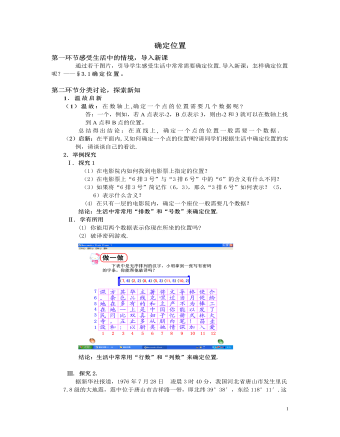
北师大初中数学八年级上册确定位置2教案
第一环节感受生活中的情境,导入新课通过若干图片,引导学生感受生活中常常需要确定位置.导入新课:怎样确定位置呢?——§3.1确定位置。第二环节分类讨论,探索新知1.温故启新(1)温故:在数轴上,确定一个点的位置需要几个数据呢? 答:一个,例如,若A点表示-2,B点表示3,则由-2和3就可以在数轴上找到A点和B点的位置。总结得出结论:在直线上, 确定一个点的位置一般需要一个数据.(2)启新:在平面内,又如何确定一个点的位置呢?请同学们根据生活中确定位置的实例,请谈谈自己的看法.2.举例探究Ⅰ. 探究1(1)在电影院内如何找到电影票上指定的位置?(2)在电影票上“6排3号”与“3排6号”中的“6”的含义有什么不同?(3)如果将“6排3号”简记作(6,3),那么“3排6号”如何表示?(5,6)表示什么含义? (4) 在只有一层的电影院内,确定一个座位一般需要几个数据?结论:生活中常常用“排数”和“号数”来确定位置. Ⅱ. 学有所用(1) 你能用两个数据表示你现在所坐的位置吗?

北师大初中数学九年级上册黄金分割2教案
2.如何找一条线段的黄金分割点,以及会画黄金矩形.3.能根据定义判断某一点是否为一条线段的黄金分割点.Ⅳ.课后作业习题4.8Ⅴ.活动与探究要配制一种新农药,需要兑水稀释,兑多少才好呢?太浓太稀都不行.什么比例最合适,要通过试验来确定.如果知道稀释的倍数在1000和2000之间,那么,可以把1000和2000看作线段的两个端点,选择AB的黄金分割点C作为第一个试验点,C点的数值可以算是1000+(2000-1000)×0.618= 1618.试验的结果,如果按1618倍,水兑得过多,稀释效果不理想,可以进行第二次试 验.这次的试验点应该选AC的黄金分割点D,D的位置是1000+(1618-1000)×0.618,约等于1382,如果D点还不理想,可以按黄金分割的方法继续试验下去.如果太浓,可以选DC之间的黄金分割 点 ;如果太稀,可以选AD之间的黄金分割点,用这样的方法,可以较快地找到合适的浓度数据.这种方法叫做“黄金分割法”.用这样的方法进行科学试验,可以用最少的试验次数找到最佳的数据,既节省了时间,也节约了原材料.●板书设计
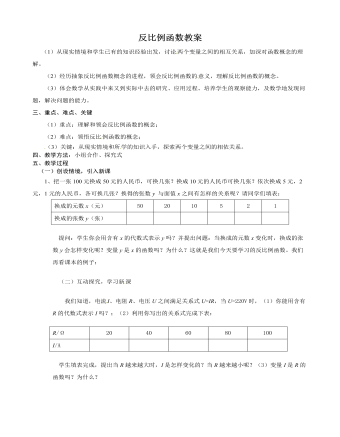
北师大初中数学九年级上册反比例函数2教案
2、某村有耕地346.2公顷,人口数量n逐年发生变化,那么该村人均占有耕地面积m(公顷/人)是全村人口数n的函数吗?是反比例函数吗?为什么?3、y是x的反比例函数,下表给出了x与y的一些值: (1)写出这个反比例函数的表达式;(2)根据表达式完成上表。教师巡视个别辅导,学生完毕教师给予评估肯定。II巩固练习:限时完成课本“随堂练习”1-2题。教师并给予指导。七、总结、提高。(结合板书小结)今天通过生活中的例子,探索学习了反比例函数的概念,我们要掌握反比例函数是针对两种变化量,并且这两个变化的量可以写成 (k为常数,k≠0)同时要注意几点::①常数k≠0;②自变量x不能为零(因为分母为0时,该式没意义);③当 可写为 时注意x的指数为—1。④由定义不难看出,k可以从两个变量相对应 的任意一对对应值的积来求得,只要k确定了,这个函数就确定了。
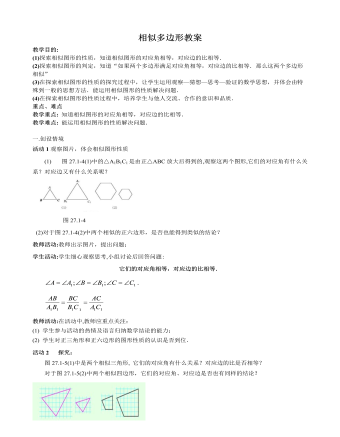
北师大初中数学九年级上册相似多边形2教案
(2)相似多边形的对应边的比称为相似比;(3)当相似比为1时,两个多边形全等.二、运用相似多边形的性质.活动3 例:如图27.1-6,四边形ABCD和EFGH相似,求角 的大小和EH的长度 .27.1-6教师活动:教师出示例题,提出问题;学生活动:学生通过例题运用相似多边形的性质,正确解答出角 的大小和EH的长度 .(2人板演)活动41.在比例尺为1﹕10 000 000的地图上,量得甲、乙两地的距离是30 cm,求两地的实际距离.2.如图所示的两个直角三角形相似吗?为什么?3.如图所示的两个五边形相似,求未知边 、 、 、 的长度.教师活动:在活动中,教师应重点关注:(1)学生参与活动的热情及语言归纳数学结论的能力;(2)学生对于相似多边形的性质的掌握情况.三、回顾与反思.(1)谈谈本节课你有哪些收获.(2)布置课外作业:教材P88页习题4.4
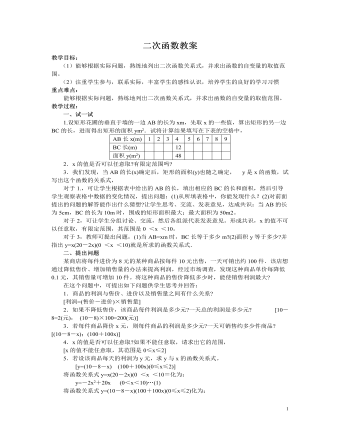
北师大初中九年级数学下册二次函数2教案
4.x的值是否可以任意取?如果不能任意取,请求出它的范围,[x的值不能任意取,其范围是0≤x≤2]5.若设该商品每天的利润为y元,求y与x的函数关系式。[y=(10-8-x) (100+100x)(0≤x≤2)]将函数关系式y=x(20-2x)(0 <x <10=化为:y=-2x2+20x (0<x<10)…(1)将函数关系式y=(10-8-x)(100+100x)(0≤x≤2)化为:y=-100x2+100x+20D (0≤x≤2)…(2)三、观察;概括1.教师引导学生观察函数关系式(1)和(2),提出问题让学生思考回答;(1)函数关系式(1)和(2)的自变量各有几个? (各有1个)(2)多项式-2x2+20和-100x2+100x+200分别是几次多项式?(分别是二次多项式)(3)函数关系式(1)和(2)有什么共同特点? (都是用自变量的二次多项式来表示的)(4)本章导图中的问题以及P1页的问题2有什么共同特点?让学生讨论、归结为:自变量x为何值时,函数y取得最大值。2.二次函数定义:形如y=ax2+bx+c (a、b、、c是常数,a≠0)的函数叫做x的二次函数, a叫做二次函数的系数,b叫做一次项的系数,c叫作常数项.
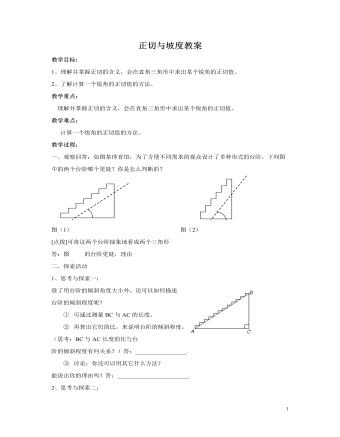
北师大初中九年级数学下册正切与坡度2教案
教学目标:1、理解并掌握正切的含义,会在直角三角形中求出某个锐角的正切值。2、了解计算一个锐角的正切值的方法。教学重点:理解并掌握正切的含义,会在直角三角形中求出某个锐角的正切值。教学难点:计算一个锐角的正切值的方法。教学过程:一、观察回答:如图某体育馆,为了方便不同需求的观众设计了多种形式的台阶。下列图中的两个台阶哪个更陡?你是怎么判断的?图(1) 图(2)[点拨]可将这两个台阶抽象地看成两个三角形答:图 的台阶更陡,理由 二、探索活动1、思考与探索一:除了用台阶的倾斜角度大小外,还可以如何描述台阶的倾斜程度呢?① 可通过测量BC与AC的长度,② 再算出它们的比,来说明台阶的倾斜程度。(思考:BC与AC长度的比与台阶的倾斜程度有何关系?)答:_________________.③ 讨论:你还可以用其它什么方法?能说出你的理由吗?答:________________________.2、思考与探索二:
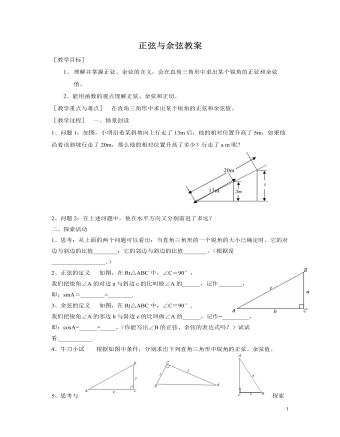
北师大初中九年级数学下册正弦与余弦2教案
[教学目标]1、 理解并掌握正弦、余弦的含义,会在直角三角形中求出某个锐角的正弦和余弦值。2、能用函数的观点理解正弦、余弦和正切。[教学重点与难点] 在直角三角形中求出某个锐角的正弦和余弦值。[教学过程] 一、情景创设1、问题1:如图,小明沿着某斜坡向上行走了13m后,他的相对位置升高了5m,如果他沿着该斜坡行走了20m,那么他的相对位置升高了多少?行走了a m呢?2、问题2:在上述问题中,他在水平方向又分别前进了多远?二、探索活动1、思考:从上面的两个问题可以看出:当直角三角形的一个锐角的大小已确定时,它的对边与斜边的比值________;它的邻边与斜边的比值________。(根据是__________________。)2、正弦的定义 如图,在Rt△ABC中,∠C=90°,我们把锐角∠A的对边a与斜边c的比叫做∠A的______,记作________,即:sinA=________=________.3、余弦的定义 如图,在Rt△ABC中,∠C=90°,我们把锐角∠A的邻边b与斜边c的比叫做∠A的______,记作=_________,即:cosA=______=_____。(你能写出∠B的正弦、余弦的表达式吗?)试试看.___________.
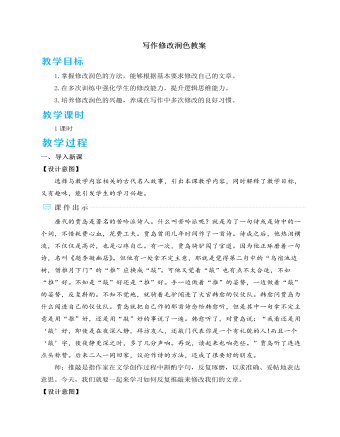
人教部编版语文九年级下册写作修改润色教案
一个人的灵魂总是会在他的眼睛和语言里得到表露。灵魂高尚者,眼光明亮,语言高雅。反过来,我们也可以通过个人的眼睛和语言而窥视到他的灵魂,眼神淫邪,语言污秽,他的灵魂必定卑鄙肮脏。修改指导:这段论述用正反双向说理的方法阐明了一个人的灵魂、眼睛、语言三者之间的关系,条理清楚,语言简明,从思维和阐述上来看,应该说是准确严密的。但是,我们可以将语言润色,使原文变得更好。修改示例:灵魂储藏在人的心中,闪动在人的眼里,表露在人的嘴上。眼睛足以传情。它毫不掩饰地展现出你的学识、品性和情操:也许你貌不惊人,眼小如豆,但它却可以流露出华美的气质;也许你美目流盼,但却可能有一个蜷曲衰败的灵魂在其中沉睡。师:精妙地运用动词,恰到好处地使用比喻、对比等修辞手法,巧妙地使用假设句式,使文章在阐释事理的同时也不乏生动形象。【设计意图】把握了习作的要求后,给学生几个片段尝试修改。学生先从“言”和“意”等方面来进行修改,教师再具体示范指导,为综合修改全文做准备。

人教版三年级下册《尾巴有只猫》教案
一、研读课文,1. 体会作者一家对三只猫的不同感情以及猫亡失后作者的感情,找出文中具体表达的句子。第一只猫:“三妹常常取了一条红带,或一根绳子,在它面前来回地托摇着,它便扑过来抢,又扑过去抢。我坐在藤椅上看着他们,可以微笑着消耗过一两个小时的光阴,那时太阳光暖暖的照着,心上感着生命的新鲜与快乐。”“我心里感着一缕的酸辛,可怜这两月来相伴的小侣!”第二只猫:“我们都很为它提心吊胆,一天都要‘小猫呢?小猫呢?’查问个好几次。”“三妹常指它笑着骂道:你这小猫呀,要被乞丐捉去后才不会乱跑呢!”“饭后的娱乐,是看它在爬树。”“我也怅然的,愤恨的,在诅骂着那个不知名的夺去我们所爱的东西的人。”“自此,我家好久不养猫。”第三只猫:“但大家都不大喜欢它,它不活泼,也不像别的小猫喜欢顽游,好像是具有天生的忧郁性似的,连三妹那样爱猫的,对于它也不加注意。”“过了几个月,它在我家仍是一只若有若无的动物。”“三妹有时也逗着它玩,但没有对于前几只小猫那样感兴趣。”“大家都去找这可厌的猫,想给它一顿惩戒。”“自此,我家永不养猫。”第一只猫“很活泼”,“我看着三妹逗猫玩的融副泄泄的生活情景,感着生命的新鲜与快乐”,当猫无故病死后“可怜这两月来相伴的小侣”并为之“酸辛”;当第二只“更有趣,更活泼”的猫在周围邻居冷漠的观望中被那些“过路人”捉走后就“怅然”、“愤恨”、“诅骂”,在这段生活经历中展示的“我的人性”充满爱心,表现得十分宽容、温馨、善良和光明。然而在“芙蓉鸟事件”发生后的“我”,不仅只凭主观猜测“妄下断语”,面对猫这个弱小、可怜的动物怒气冲天“拿木棒追打”、“心里还愤的,以为惩戒的还没有快意”,人在动物面前恃强凌弱,则充分暴露了人性中凶恶、冷酷、残暴和阴暗的一面。不过,当“我”明白这只丑猫并非是罪魁祸首后,良心受到了谴责。2. 说说为何“我”对第三只猫的死比前两只猫的亡失“更难过得多”?第二只猫丢失后,作者写道:“自此,我家好久不养猫。”第三只猫死后,作者又写道:“自此,我家永不养猫。”试着联系课文中的描写,体会这两句话中包含的思想感情有什么不同?因为第三只猫的死责任在“我”。我们的主观臆断,断定鸟是它咬死的,暴怒之下“我”用木棒打它,它受到冤苦无处辩诉,最后死在邻家屋檐上。“我”认为是“我”把它害死的,而且这个过失是无法补救的。这句话在内容上是对全文的总结。“我”目睹了前两只猫的不幸后,又亲自制造了第三只猫的悲剧,深感负疚,为了不再看到这样的悲剧重演下去,“自此,我家永不养猫”这句话与文章的开头遥相呼应,在结构上形成了首尾呼应的特点。
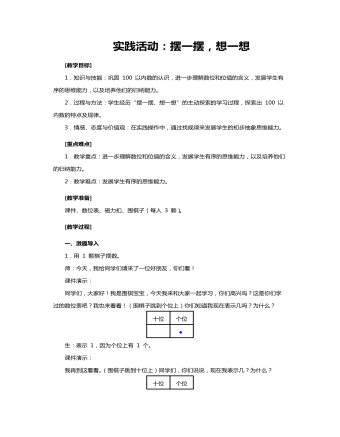
人教版一年级数学《实践活动摆一摆,想一想》教案
[教学目标]1.知识与技能:巩固 100 以内数的认识,进一步理解数位和位值的含义,发展学生有序的思维能力,以及培养他们的归纳能力。2.过程与方法:学生经历“摆一摆、想一想”的主动探索的学习过程,探索出100 以内数的特点及规律。3.情感、态度与价值观:在实践操作中,通过找规律来发展学生的初步抽象思维能力。[重点难点]1.教学重点:进一步理解数位和位值的含义,发展学生有序的思维能力,以及培养他们的归纳能力。2.教学难点:发展学生有序的思维能力。[教学准备] 课件、数位表、磁力扣、围棋子(每人3 颗)。[教学过程]一、激趣导入1.用 1 颗棋子摆数。师:今天,我给同学们请来了一位好朋友,你们看!课件演示:同学们,大家好!我是围棋宝宝,今天我来和大家一起学习,你们高兴吗?这是你们学过的数位表吧?我也来看看!(围棋子跳到个位上)你们知道我现在表示几吗?为什么?生:表示 1,因为个位上有 1 个。
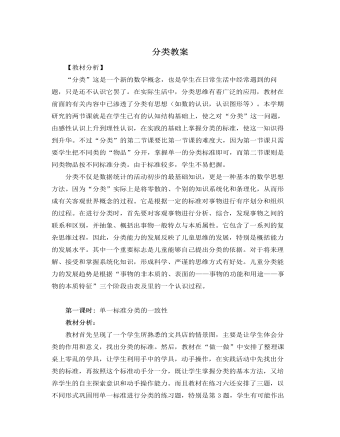
人教版新课标小学数学一年级上册分类教案
教学目标:1.能选择不同的标准对同一类物品进行不同的分类,掌握分类的方法。2.初步感知不同标准分类的意义,体验分类结果在不同标准下的多样性。3.培养学生思维的灵活性和发散性,养成良好的学习、生活习惯。4.培养学生的操作能力、观察能力、判断能力、语言表达能力和合作交流的意识。5.让学生体会到生活中处处有数学,学会用学到的知识解决生活中的实际问题。教学重、难点:重点:选择不同标准分类难点:思维的发散性 关键:在直观中拓展思维的时空教学准备:铅笔、实物卡片、学具袋(各种形状、颜色各异的物品)教学过程:一、观察分析 多重分类1.师出示如书本P39页的铅笔。(1)观察这些铅笔有什么不同?并把它们分分类。(2)四人一小组交流、讨论可以怎么分类?是按什么分的?比比哪一组的分法最多。
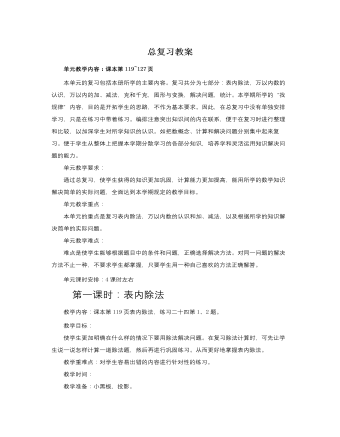
人教版新课标小学数学二年级下册总复习教案
教学时间:教学准备:小黑板,挂图。教学过程:一、复习旧知,引入新课。1、请大家想一想到今天为止,我们已经复习了本学期学过的哪些知识?(表内除法。万以内数的认识和加法、减法。克和千克及图形的变换。)2、对这些知识还有没有什么问题?还有没有内容是我们没有复习到或复习了掌握不好的?如果学生有问题,则针对问题,让同学们一起来想办法解决这些问题。学生提出问题,思考解决方法。二、复习整理:1、分别出示教材第122页第13、14题的挂图。(如果没有,就让学生直接看书)(1)看了图后,你明白图中的画是什么意思吗?学生看挂图,小组讨论这两题的意思。叙述两幅图的意思,没有说好的请其他同学来补充完整。在小组内讨论交流。(2)怎样来解决这两个生活中的实际问题?
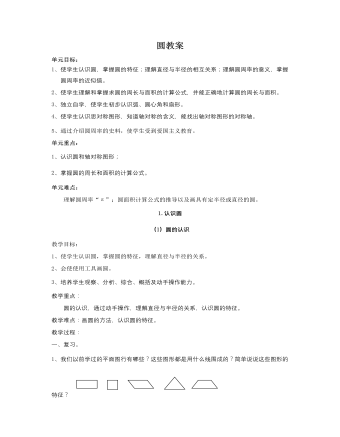
人教版新课标小学数学六年级上册圆教案
教学追记:本堂课,在我带领着学生利用教具进行操作,在此基础上,让学生自主发现圆的面积与拼成长方形面积的关系,圆的周长、半径和长方形的长、宽的关系,并推导出圆的面积计算公式。教学环形的面积计算时,我充分放手给学生,让学生通过思考讨论领悟出求环形的面积是用外圆面积减去内圆面积,并引导他们发现这两种算法的一致性,同时提醒学生尽量使用简便算法,减少计算量。圆的周长和面积的练习课教学目标:1、通过教学使学生理解并掌握圆的周长和面积计算方法。2、培养学生分析问题和解决问题的能力,发展学生的空间观念。3、灵活解答几何图形问题。教学重点:认真审题,分辨求周长或求面积。教学过程:一、复习。1、求出下面圆的周长和面积并用彩笔描出周长,用阴影表示出面积。


